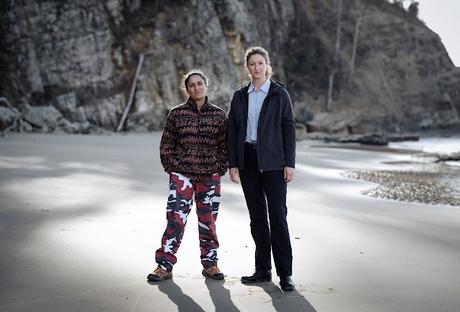
When I moved to Australia almost ten years ago now, some of the first stories I was told about my new home were about the horrendous crimes that had been committed over the past century, especially in South Australia. It was an odd but fitting introductions for someone from a city that had, over the last twenty years, also been frequently in the news for remarkably bizarre and horrifying crimes. I’ve been struggling with the question of how shows about police can work and can be responsibly made, but the idea of creating a story in which the nature of the crime is deeply connected to the history and culture of a specific place resonates.
I really didn’t know what to expect of Deadloch when I started watching except that it came highly recommended and was something that I looked forward to from the trailers. It would be difficult to truly capture in a review what the tone of this show is, and to explain why it works, especially viewed from the perspective of having finished the final episode of the first season. It’s a crime comedy, one that on paper shouldn’t work but somehow does. If I’m being honest, for the first few episodes I wasn’t sure that it was working – up until roughly the point when Eddie Redcliffe (played by Madeleine Sami, who is from New Zealand and adopts the broadest possible Northern Territories accent for the role) opens up about the trauma she experienced when her previous partner died. It explains the way she’s approached her unwanted assignment to the small Tasmanian town of Deadloch, and the brash way in which she treats the other officers working with her, especially Dulcie Collins (a great Kate Box). It changes the emotional make-up of the show, and suddenly creates a dynamic between the two that carries the rest of the series. As much as the town is weighed down and haunted by its history, the two main characters are also struggling with past traumas and personal failings, and from the moment that they recognize this in each other, they become better as a team.
Deadloch is the name of the show, and it fits – because this isn’t just necessarily about the crimes that are being investigated (local men whose bodies appear near the lake, tongues surgically removed), but about the secrets that Dulcie and Eddie uncover as they try to figure out how the victims are connected. Their investigations delve deeply into local horrors that all have to do with how women have suffered at the hands of these men, and how the town has frequently brushed aside these transgressions without holding its male inhabitants responsible. The town is one of the characters on the show – from the frequently profoundly incompetent officers who work with Dulcie (the exception is Nina Oyama’s Abby, who learns to rely on her great instincts in the course of the series as she throws of the shackles of her truly horrible fiancé, whose comeuppance is one of the most satisfying outcome of the finale), to the annual arts “feastival” that feels deeply familiar in 2023 Australia and creates a rift between the rusted on inhabitants of the town who growl at it from the safe perch of the local pub and the new arrivals. Then there’s the brilliant decision to have Deadloch be home to a thriving queer community (again deeply at odds with the punters), that includes Dulcie’s partner Cath (Alicia Gardiner), who is in the process of convincing Dulcie to leave her job and run a petting zoo/animal farm with her, a cause she pursues with a conviction that is later explained by Dulcie’s history of infidelity. It also creates a fantastic red herring for the conclusion of the murder investigation, considering who the victims are and who they have wronged. When the actual murderer is revealed – and it’s a rare case where the answer does remain successfully elusive for an impressive amount of time – the motives of the murders tie in perfectly with the show’s themes of toxic masculinity and misogyny, with a well-thought out twist.
None of this truly captures how hilarious the show is – from the situational comedy of Eddie reluctantly acclimatising to the cold and wet of Tasmania in a camping store (and, at one point, replacing her broken thong (that’s a flip flop) with a home-made cardboard one, to the local walrus that comes with its own lore, to the many eccentric characters on the edges of the story. There is also a resonant minor storyline about the fraught relationship between the local Aboriginal women and the town – a local minor cookbook celebrity (I would love to hear speculation about who this is partly based on, but again as someone who’s Adelaide-based, I have an idea) has profited from Tasmania’s horrifying history of colonization and acquired perverse wealth. What she offers in return instead of acknowledging where her wealth has come from and how absurd it is to own an entire island off the coast is charity that comes with many strings attached, and is really just a continuation of violence (attempting to shape a local girl into what he deems acceptable, while withholding support for a girl passionate about creating a footy team).
All of this is to say that Deadloch is one of the most enjoyable shows that have come out this year. I’d recommend watching it slowly rather than binging it, because part of the joy of it has been to sit there week by week and try to untangle the many clues into a cohesive theory. The cast is outstanding, and a lot of attention has gone into creating an entire world here – one that I hope we’ll get to return to for more seasons (even if they take us to Darwin, not fictional but also deeply idiosyncratic).
2023-, created by Kate McCartney and Kate McLean, starring Kate Box, Madeleine Sami, Alicia Gardiner, Nina Oyama, Holly Austin, Tom Ballad, Astrid Wells, Duncan Fellows, Kris McQuade, Shaun Martindale, Kartanya Maynard, Mia Morrissey, Naarah, Pamela Rabe.

